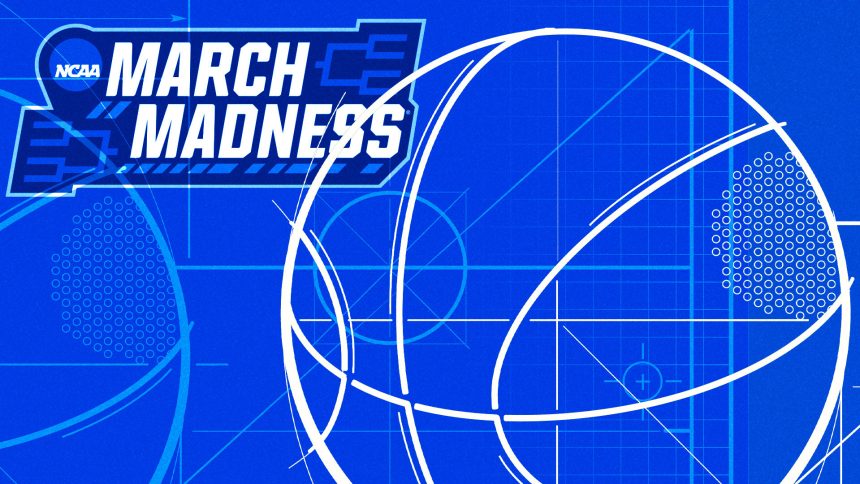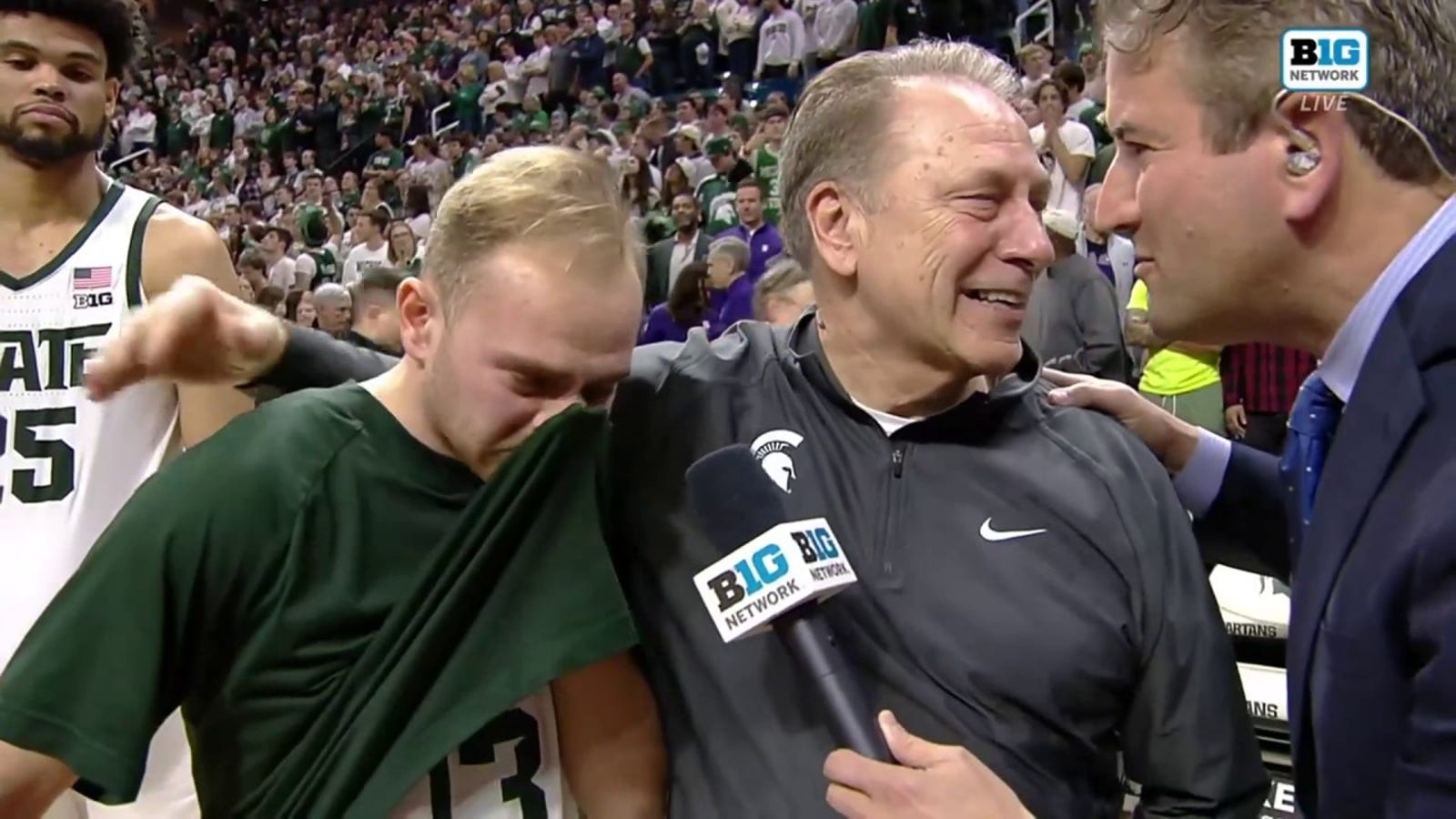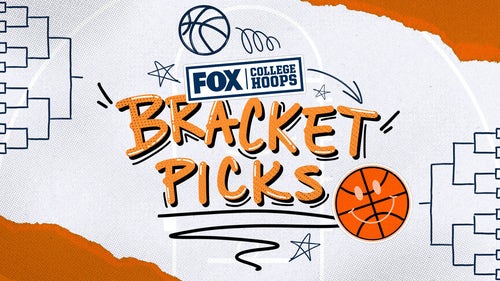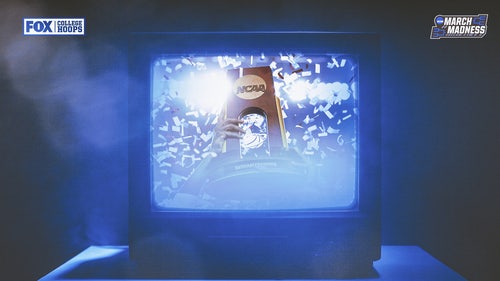FOX Sports Research
The Big Dance is finally upon us.
“March Madness” begins this week, as 68 teams will embark on their respective journeys, all attempting to win the 2024 NCAA Men’s Basketball Tournament.
[2024 Men’s NCAA Tournament bracket]
With so many trends to look into, we broke the tournament down in sections in order to give you the best information possible to build your bracket.
ADVERTISEMENT
From general notes and KenPom leaders to past performances from a conference-by-conference perspective, here is everything you need to know about the NCAA Tournament.
Let’s take a look:
General notes
- This is the 85th NCAA Tournament in the event’s history; it has taken place every year since 1939 except for 2020, when it was canceled due to the COVID-19 pandemic.
- The first edition of the tournament comprised just eight teams in 1939.
- The NCAA tournament field grew to 16 teams in 1951, doubled to 32 in 1975 and expanded to its current size of 64 teams in 1985.
- This will be the 39th edition of the tournament in the 64-team format (since 1985).
- There are 9,223,372,036,854,775,808 possible bracket outcomes (nine quintillion, two hundred twenty-three quadrillion, three hundred seventy-two trillion, thirty-six billion, eight hundred fifty-four million, seven hundred seventy-five thousand, eight hundred eight).
- In the 12 years since the First Four was established, one of those teams has won at least two games 11 times, including an unlikely run by Fairleigh Dickinson last season.
- Bill Self is coaching his 19th straight NCAA Tournament as a No. 4 seed or better with Kansas; this is his 23rd straight tournament appearance as well.
- Tom Izzo is making his 26th straight NCAA Tournament appearance with Michigan State, the most consecutive appearances by a men’s head coach ever.
- Kansas has made 34 consecutive NCAA Tournament appearances, the longest streak in college basketball history.
- Gonzaga is making its 25th straight NCAA Tournament appearance, the fourth-longest streak ever; 24 of those appearances have come with Mark Few.
- Houston is the best-seeded team in the field without a national title.
- Eight head coaches are making their NCAA Tournament debut: Kyle Smith (Washington State), Mark Byington (James Madison), Bucky McMillan (Samford), Bashir Mason (Saint Peter’s), Donnie Jones (Stetson), Matt Logie (Montana State), Donte Jackson (Grambling State), Donald Copeland (Wagner).
- North Carolina has 131 NCAA Tournament wins, the most of any school ever; Kentucky has the second-most with 130 (excludes two vacated wins in the 1988 tournament).
- Rick Barnes is making his 28th NCAA Tournament appearance, the most of any coach in the tournament.
- Two teams are making their NCAA Tournament debut: Stetson and Duquesne
- Christian Laettner (Duke), is the NCAA tournament’s all-time leading scorer with 407 points; only nine players have more than 300 points in March Madness.
- Notre Dame’s Austin Carr holds the record for the most points in an NCAA Tournament game, with 61 against Ohio in 1970.
- UCLA has the most titles of any school all-time with 11, but has not won since 1995 and did not make the tournament this year.
KenPom leaders
- UConn is ranked at the top of Division-I in KenPom’s adjusted offensive efficiency rating.
- Iowa State is ranked at the top of D-I in KenPom’s adjusted defensive efficiency rating.
- UConn is ranked at the top of D-I in adjusted efficiency margin
- South Carolina is ranked at the top of all tournament teams in KenPom’s luck factor.
- Baylor is ranked at the top of D-I in KenPom’s strength of schedule.
- Purdue is ranked at the top of D-I in KenPom’s effective height rating.
- TCU is ranked at the top of all tournament teams in KenPom’s experience rating.
- Samford is ranked at the top of all tournament teams in KenPom’s bench rating.
*Note: Since 2001, all 22 tournament champions in that span entered the tournament in the top 25 of KenPom’s adjusted efficiency margin.
Conference trends
- The last time one conference produced three No. 1 seeds was 2009, when the Big East sent Pittsburgh, UConn, and Louisville.
- The Big 12 and SEC received eight bids to this year’s tournament, the most of any conference this year.
- Horizon League schools are 0-11 in the Round of 64 since 2012, with the last win coming from Butler (now in Big East) in 2011; Oakland is making its first tournament appearance since 2011, and is 1-3 all-time in the dance.
- Northeast Conference schools are 1-31 all-time in the Round of 64, with the lone win coming from Fairleigh Dickinson last year; Wagner is making its second NCAA Tournament appearance in school history and is 0-1 all-time in the dance.
- Colonial Athletic schools are 0-10 in the Round of 64 since 2013, with the last win coming from VCU (now in Atlantic 10) in 2012; Charleston is making its second straight tournament appearance and is 1-6 all-time in the dance.
- Big South schools are 1-27 in the Round of 64 all-time, with the lone win coming from Winthrop in 2007; Longwood is making its second tournament appearance and is 0-1 all-time in the dance.
- Since the tournament expanded to 64 teams in 1985, every national champion has made it to at least the semifinals of their conference tournament (if the conference held a tournament in the year they won).
- Mountain West teams are 2-12 in the Round of 64 over the last seven NCAA Tournaments.
- A team from the Missouri Valley Conference has won in the Round of 64 in eight of the past 11 NCAA Tournaments.
- A team from Conference-USA has won in the Round of 64 in six of the past eight NCAA Tournaments.
- The Southern Conference is looking to win an NCAA Tournament game in consecutive years for the first time since 1976-1977; Furman won last year and Samford will look to make it two in a row this year.
First Round trends
- No. 1 seeds are 150-2 vs. No. 16 seeds in the Round of 64 since 1985.
- No. 2 seeds are 141-11 vs No. 15 seeds in the Round of 64 since 1985.
- No. 3 seeds are 130-22 vs No. 14 seeds in the Round of 64 since 1985.
- No. 4 seeds are 120-32 vs No. 13 seeds in the Round of 64 since 1985.
- No. 5 seeds are 99-53 vs No. 12 seeds in the Round of 64 since 1985.
- No. 6 seeds are 94-58 vs No. 11 seeds in the Round of 64 since 1985.
- No. 7 seeds are 92-59 vs No. 10 seeds in the Round of 64 since 1985.
- No. 8 seeds are 74-78 vs No. 9 seeds in the Round of 64 since 1985.
- At least one top-four seed has lost in the Round of 64 in 14 of the past 15 tournaments, with the exception being 2017.
- Since the tournament expanded to 64 teams in 1985, only five times has every No. 1, No. 2, No. 3, and No. 4 seed won their first-round game; the last time it happened was in 2017 (2007, 2004, 2000, 1994)
- There has only been one instance of all four No. 10 seeds defeating the No. 7 seed, coming in the 1999 tournament.
- In five of the past 10 tournaments, a No. 14 seed has beaten a No. 3 seed; however, only one No. 14 seed has defeated a No. 3 seed in the last five tournaments (2021 Abilene Christian defeated Texas)
- In 11 of the past 15 tournaments, at least one 13-seed has beaten a No. 4 seed.
- 12 seeds have won 53 first-round games since the field expanded to 64 teams in 1985; 1988, 2000, 2007, 2015, 2018 and last year, 2023, are the only years to not see a No. 12 seed beat a No. 5 seed.
- A No. 15 seed has defeated a No. 2 seed in three straight tournaments, the first time that’s happened in tournament history; all three went on to make the Sweet 16 as well.
- ACC teams are 19-14 in the Round of 64 over the last five NCAA Tournaments.
- Big 12 teams are 25-8 in the Round of 64 over the last five NCAA Tournaments.
- Big Ten teams are 28-8 in the Round of 64 over the last five NCAA Tournaments.
- Big East teams are 14-10 in the Round of 64 over the last five NCAA Tournaments.
- Pac-12 teams are 9-6 in the Round of 64 over the last five NCAA Tournaments.
- SEC teams are 24-10 in the Round of 64 over the last five NCAA Tournaments.
Second Round trends
- No. 1 seeds are 58-16 vs No. 8 seeds in the Round of 32 since 1985.
- No. 1 seeds are 70-6 vs No. 9 seeds in the Round of 32 since 1985.
- No. 2 seeds are 60-27 vs No. 7 seeds in the Round of 32 since 1985.
- No. 2 seeds are 35-19 vs No. 10 seeds in the Round of 32 since 1985.
- No. 3 seeds are 48-30 vs No. 6 seeds in the Round of 32 since 1985.
- No. 3 seeds are 32-20 vs No. 11 seeds in the Round of 32 since 1985.
- No. 4 seeds are 44-35 vs No. 5 seeds in the Round of 32 since 1985.
- No. 4 seeds are 28-13 vs No. 12 seeds in the Round of 32 since 1985.
- No. 5 seeds are 17-3 vs No. 13 seeds in the Round of 32 since 1985.
- No. 6 seeds are 14-2 vs No. 14 seeds in the Round of 32 since 1985.
- No. 7 seeds are 2-4 vs No. 15 seeds in the Round of 32 since 1985.
- No. 9 seeds are 2-0 vs No. 16 seeds in the Round of 32 since 1985.
- No. 10 seeds are 5-0 vs No. 15 seeds in the Round of 32 since 1985.
- No. 11 seeds are 6-0 vs No. 14 seeds in the Round of 32 since 1985.
- No. 12 seeds are 9-3 vs No. 13 seeds in the Round of 32 since 1985.
- Since 2008, No. 3 seeds have gone 22-5 against No. 6 seeds; the count was 26-25 from 1985 to 2007.
Sweet 16 trends
- The last time all four No. 1 seeds made the Sweet 16 came in 2019; since 2005, it’s happened seven other times (2016, 2012, 2009, 2008, 2007, 2006, 2005)
- Only two times in the past 26 NCAA Tournaments have all four No. 2 seeds made the Sweet 16 (2009, 2019); since the tournament expanded to 64 teams in 1985, it’s happened three other times (1989, 1995, 1996).
- An ACC team has made the Sweet 16 in every tournament since 1980.
- The ACC has had multiple teams in the Sweet 16 in 32 of the last 38 NCAA Tournaments (since 1985).
- At least one double-digit seed has reached the Sweet 16 every year since seeding began (1979), with the exception of four tournaments (1981, 1982, 1995, 2007); it’s been 15 straight years in which a double-digit seed has made the Sweet 16.
- A No. 11 seed has made the Sweet 16 in seven of the past nine tournaments; multiple No. 11 seeds have made it to the Sweet 16 in five of the past 12 tournaments.
- Gonzaga has made the Sweet 16 in eight straight tournaments; if they make it this year, they will tie UNC for the most consecutive Sweet 16 appearances in the 64-team format (UNC made it from 1998-2006).
Elite Eight trends
- The last time all four No. 1 seeds reached the Elite Eight was 2016; before that it happened three straight years from 2007 to 2009.
- In 11 of the past 12 tournaments, a No. 7 seed or worse has made the Elite Eight, with the lone exception in that span being 2019.
- In seven of the past nine tournaments, there have been at least two teams seeded No. 6 or worse reach the Elite Eight.
- Since seeding began in 1979, there has only been one tournament in which there was not a single No. 1 seed in the Elite Eight — last year.
- The ACC has had at least one team in the Elite Eight in 34 of the last 38 NCAA Tournaments (since 1985).
- The SEC has had at least one team in the Elite Eight in 24 of the past 31 NCAA Tournaments (since 1992).
Final Four trends
- Last season, there was not a single No. 1 seed in the Final Four- ending a streak of 10 consecutive tournaments with at least one.
- Every NCAA Tournament since 2013 has had a No. 5 seed or lower reach the Final Four.
- Since the tournament expanded to 64 teams in 1985, all four No. 1 seeds have only made the Final Four once — 2008 (North Carolina, Kansas, Memphis, UCLA).
- Since 2010, only 16 out of 52 1-seeds have made the Final Four (30.8%).
- A No. 1 seed has made the Final Four in 14 of the last 16 tournaments, with the exceptions coming in 2011 and 2023.
- At least one team seeded No. 7 or worse has reached the Final Four in nine of the past 10 tournaments, with the lone exception coming in 2019.
- A team seeded No. 12 or worse has never made the Final Four (every seed from No. 1 to No. 11 has made a Final Four).
- A No. 6 seed has not made the Final Four since Michigan’s “Fab Five” did so in 1992; since then, every other seed from No. 1 to No. 11 has made the Final Four.
- Florida in 2007 is the last time a reigning champ made the Final Four.
- Five No. 11 seeds have made the Final Four since seeding began in 1979: 1986 LSU, 2006 George Mason, 2011 VCU, 2018 Loyola-Chicago, 2021 UCLA.
- The ACC has had at least one team in the Final Four in 26 of the last 38 NCAA Tournaments (since 1985).
National Championship trends
- A top-three seed has won the national title 22 of the past 24 tournaments, with the lone exceptions being 2014 UConn (No. 7 seed) and 2023 UConn (No. 4 seed).
- Twelve of the last 16 tournament champions have been No. 1 seeds.
- A No. 5 seed has yet to win the national title, the only seed within the top eight that has not won.
- A No. 2 seed has not made the title game since 2016.
- Since seeding began in 1979, No. 1 seeds have 26 national titles, while the rest of the seeds combined have 18 titles.
- Since seeding began in 1979, 71 of the 88 teams to reach the title game have been top-three seeds.
- The overall No. 1 seed has not won the title since Louisville in 2013.
- A Big 12 team has reached the title game in three of the past four tournaments, with two of them winning it all (2021 Baylor, 2022 Kansas).
- Thirty-seven programs have won a national title since the tournament’s conception in 1939.
- Of the 68 teams in the tournament, 15 of them have won it before: Arizona, Baylor, Duke, Florida, Kansas, Kentucky, Marquette, Michigan State, NC State, North Carolina, Oregon, UConn, Virginia, Wisconsin.
- The AP no. 1 has not won the national championship since 2012 when Kentucky defeated Kansas.
- The AP no. 1 and 2 teams have met seven times in the championship game, with the most recent instance coming in 2005 when no. 2 North Carolina defeated no. 1 Illinois.
- The last team from Mountain or Pacific time zone to win the title is Arizona in 1997.
- The last Big Ten team to win the title was Michigan State in 2000.
- The ACC has had at least one team in the title game in 18 of the last 38 NCAA Tournaments (since 1985).
recommended

Get more from College Basketball Follow your favorites to get information about games, news and more






















